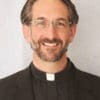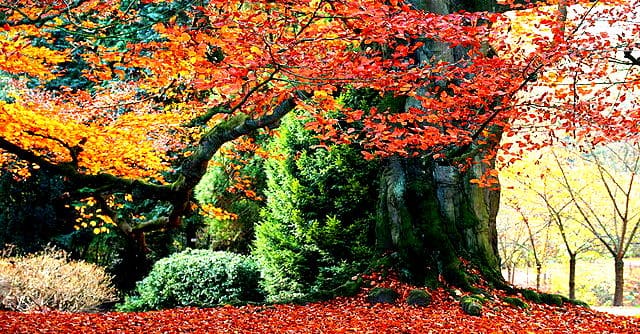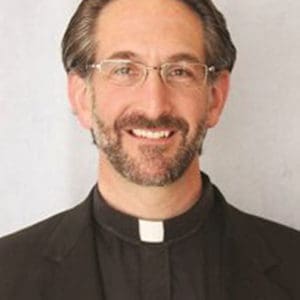Are You Living It Right?
I wonder sometimes about the outcome of a still verdictless life. Am I living it right?
John Mayer
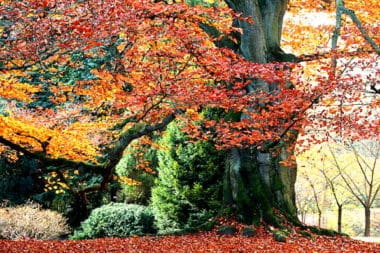 God uses nature and the seasons to teach us many lessons about life. If you’ve been reading [my] blog, you’ve probably noticed that I like to write about autumn simply because I think it is the most poetic season (at least in New England), a season that teaches us many lessons. Last week I found myself contemplating how the colors of the leaves become more beautiful the closer they come to death.
God uses nature and the seasons to teach us many lessons about life. If you’ve been reading [my] blog, you’ve probably noticed that I like to write about autumn simply because I think it is the most poetic season (at least in New England), a season that teaches us many lessons. Last week I found myself contemplating how the colors of the leaves become more beautiful the closer they come to death.
As I pondered this reality, it struck me that our lives should reflect the lesson the foliage teaches us: the more we age, the holier we should become. The older we get, we should become wiser, more virtuous, and enjoy an ever-deepening relationship with the Lord and with the most important people in our lives.
The problem, however, is that aging seems to be the one thing that most people try to avoid. I truly believe that one of the reasons some people fill their lives with things that can’t satisfy them is because they are afraid of facing the reality of their death. Meditating upon our death, however, is a wonderful way to teach us how to live.
I was blessed to spend the first semester of my sophomore year in college in the beautiful country of Austria in the little town of Gaming. We lived in a beautifully renovated 14th century Carthusian monastery nestled in the foothills of the Alps. To this day I swear that it is the closest I’ve come to 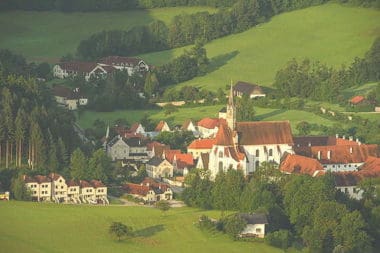 paradise on earth. I’ll always remember walking through the courtyard and, many days, watching the morning clouds rising off the foothills. Each morning it was like waking up in a fairytale. There was a real sense of the holy, particularly since for hundreds of years monks lived and prayed there in silence. They were, however, allowed to speak to one another once a year. And do you know what they chose to say the one time they were able to speak? “Brother, remember your death.”
paradise on earth. I’ll always remember walking through the courtyard and, many days, watching the morning clouds rising off the foothills. Each morning it was like waking up in a fairytale. There was a real sense of the holy, particularly since for hundreds of years monks lived and prayed there in silence. They were, however, allowed to speak to one another once a year. And do you know what they chose to say the one time they were able to speak? “Brother, remember your death.”
The wisdom of the saints teaches us that it is good to meditate on our death and final judgment. It is not meant to be a morbid practice; rather, it is meant to inspire us to live holier lives and to focus us on our final end. As my father likes to say, “we’re just renting space here.” In other words, this place is not our true home; heaven is.
Stephen Covey, in his bestselling The 7 Habits of Highly Effective People, writes about beginning with the end in mind. He invites us to reflect on our own funeral and what people would say about us in the eulogy. Meditating on our final end is a powerful way to focus us on the most important aspects of our lives: faith, family, relationships, and living a holy and virtuous life. How many of us, for example, when contemplating our death come to the conclusion that we want our legacy to be about money or the amount of hours that we worked? No. We want our legacy to be a virtuous life, a life that touched the lives of others.
John Mayer poses an important question: Am I living it right? When we meditate on our death and final judgment, we are forced to answer that question; we are forced to ask ourselves if we’re on the road to heaven. We must not forget that when we die the Lord will judge us. The final verdict of our lives will be rendered only after our death. We should be ready to give an account of our lives to the Lord today, for we do not know when our last day will be.
So here’s a spiritual exercise for your prayer: Think deeply about one word or phrase that describes the legacy you want to leave, the word or phrase that you would want to have written on your gravestone. Speak to the Lord about your life and let Him show you the areas where you may not be “living it right.” Ask forgiveness for the ways you’ve not lived it right, and resolve to live today and everyday as if it were the last day of your life.
Previously published on Father Najim’s former blogsite. Used with permission.
+
Art: Copper Beech or Purple Beech (Fagus sylvatica ‘purpurea’), Jean-Pol GRANDMONT, 6 Nov 2007; Ehem. Kartäuserkloster Marienthron (Former Carthusian monastery Marienthron), Rudolf Schneck, 24 September 2012 own work; both CCA-SA, Wikimedia Commons.


